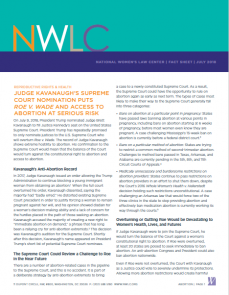Abortion rights, women of color, and LGBTQIA+ people are under attack. Pledge to join us in fighting for gender justice.
 On July 9, 2018, President Trump nominated Judge Brett Kavanaugh to fill Justice Kennedy’s seat on the United States Supreme Court. President Trump has repeatedly promised to only nominate justices to the U.S. Supreme Court who will overturn Roe v. Wade. The record of Judge Kavanaugh shows extreme hostility to abortion. His confirmation to the Supreme Court would mean that the balance of the Court would turn against the constitutional right to abortion and access to abortion.
On July 9, 2018, President Trump nominated Judge Brett Kavanaugh to fill Justice Kennedy’s seat on the United States Supreme Court. President Trump has repeatedly promised to only nominate justices to the U.S. Supreme Court who will overturn Roe v. Wade. The record of Judge Kavanaugh shows extreme hostility to abortion. His confirmation to the Supreme Court would mean that the balance of the Court would turn against the constitutional right to abortion and access to abortion.
Kavanaugh’s Anti-Abortion Record
In 2017, Judge Kavanaugh issued an order allowing the Trump Administration to continue blocking a young immigrant woman from obtaining an abortion. When the full court overturned his order, Kavanaugh dissented, saying the majority had “badly erred.” He distorted existing Supreme Court precedent in order to justify forcing a woman to remain pregnant against her will, and his opinion showed disdain for a woman’s decision-making ability and a lack of concern for the hurdles placed in the path of those seeking an abortion. Kavanaugh accused the majority of creating a new right to “immediate abortion on demand,” a phrase that has long been a rallying cry for anti-abortion extremists. This decision was Kavanaugh’s audition for the Supreme Court. Shortly after this decision, Kavanaugh’s name appeared on President Trump’s short list of potential Supreme Court nominees.
The Supreme Court Could Review a Challenge to Roe in the Near Future
There are a number of abortion-related cases in the pipeline to the Supreme Court, and this is no accident. It is part of a deliberate strategy by anti-abortion extremists to bring a case to a newly constituted Supreme Court. As a result, the Supreme Court could have the opportunity to rule on abortion again as early as next term. The types of cases most likely to make their way to the Supreme Court generally fall into three categories:
- Bans on abortion at a particular point in pregnancy: States have passed laws banning abortion at various points in pregnancy, including bans on abortion starting at 6 weeks of pregnancy, before most women even know they are pregnant. A case challenging Mississippi’s 15-week ban on abortion is currently before a federal district court.
- Bans on a particular method of abortion: States are trying to restrict a common method of second-trimester abortion. Challenges to method bans passed in Texas, Arkansas, and Alabama are currently pending in the 5th, 8th, and 11th Circuit Courts of Appeals.
- Medically unnecessary and burdensome restrictions on abortion providers: States continue to pass restrictions on abortion providers in an effort to shut them down, despite the Court’s 2016 Whole Woman’s Health v. Hellerstedt decision holding such restrictions unconstitutional. A case challenging an Arkansas law that would force two of the three clinics in the state to stop providing abortion and effectively ban medication abortion is currently working its way through the courts.
Overturning or Gutting Roe Would be Devastating to Women’s Health, Lives, and Futures
If Judge Kavanaugh were to join the Supreme Court, he would turn the balance of the Court against a woman’s constitutional right to abortion. If Roe were overturned, at least 20 states are poised to seek immediately to ban abortion. An anti-abortion Congress and President could also ban abortion nationwide.
Even if Roe were not overturned, the Court with Kavanaugh as a Justice could vote to severely undermine its protections. Allowing more abortion restrictions would create harmful barriers that delay access and increase both the direct and indirect costs of abortion, including travel costs. For some women, these hurdles would act as a complete obstacle, and they will be forced to carry an unwanted pregnancy to term.
Women of color, young people, and individuals in the LGBTQ community already face a host of barriers to getting health care and are disproportionately affected by restrictions on access to abortion. Further restrictions on access to abortion, and especially overturning Roe, will harm them the most.
Judge Kavanaugh presents a dire threat to Roe v. Wade and the constitutional right to abortion, and his nomination jeopardizes the health, lives, equality, and dignity of individuals across the country.
